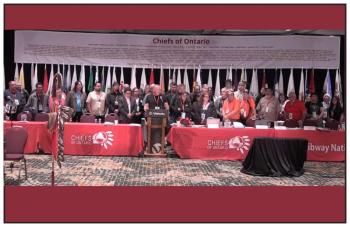Image Caption
Summary
Local Journalism Initiative Reporter
Windspeaker.com
Chiefs of Ontario (COO) have asked Crown-Indigenous Relations Minister Marc Miller to delay legislation that would implement a self-government agreement with the Métis Nation of Ontario (MNO). The legislation is to be introduced in the House of Commons on June 19.
This morning, flanked by the other chiefs of the province, Nipissing First Nation Chief Scott McLeod led a pointed discussion with Miller, who appeared virtually on the last day of the COO’s three-day annual chiefs assembly.
That discussion clearly left the minister struggling for words as he tried to balance the concerns voiced by the First Nations with the MNO’s Sect. 35 right to self-governance.
“I do feel very awkward…speaking about MNO without them present... Perhaps there is a forum in which those concerns can be addressed directly to them because this is about a relationship and I’m sure they would be more than glad to do that,” said Miller at the end of the conversation.
But McLeod reiterated that chiefs were not comfortable holding a discussion with the MNO who, as far as COO was concerned, had not proven that their members were legitimate rights holders.
“Unlike your government, we need to be sure of who we are meeting with and that those people are the right people,” said McLeod.
McLeod prefaced his words by making it clear that COO’s concerns were not lateral violence against Métis and that Ontario First Nations respected legitimate rights holders.
However, he stressed that two expert reports presented to the federal government in April disputed the claim by the MNO of six historical Métis communities beyond the one as recognized in the Métis Nation homeland map.
He added that the Manitoba Métis Federation had expressed the same concerns.
In 2017, a study undertaken by the Ontario government and the MNO formally recognized these six other historic Métis communities. Up to that point, the historic Métis community was located only in northwestern Ontario along the Manitoba border.
“What research has Canada done to support this recognition?” asked McLeod.
He said that First Nations were already facing resource challenges when it came to funding for housing, clean water, mental and physical health services.
“The reality is that creating new groups without legitimate researched evidence will reduce the amount of resource available to deal with the urgent issues we face as rights holders,” McLeod said.
Miller said he had not looked at the two reports the chiefs had sent—one published by the Wabun Tribal Council in 2022 and one by Robinson-Huron Waawiindamaagewin this past spring—although his staff had.
The minister did, however, acknowledge that the MNO had “struggles defining their membership and tying it back to ancestral ties and community ties and traditions and culture that are Métis, but the process has gotten a lot more robust in the last couple of years.”
Miller called the upcoming legislation “very skeletal in nature” and said he could not understand COO’s disagreement with the legislation.
He held that the federal legislation was not about recognizing the historic Métis communities put forward by the MNO nor about title or land. It was simply about recognizing the MNO’s right to govern itself under Sect. 35.
In February, Ottawa signed separate updated self-government recognition and implementation agreements with the Métis Nations in Ontario, Saskatchewan and Alberta.
“We undertook as part of the signing of these self-government agreements the duty to pass legislation expeditiously,” said Miller.
However, despite McLeod’s charges of the process being rushed, and not transparent, Miller said he had not made any public statement that debate would be limited nor had he committed to “forcing this through Parliament.”
COO representatives will be in Ottawa on Monday, opposing the federal legislation for implementing self-government for the three Métis Nations.
At the request of McLeod, Miller said he would try to meet with them on Monday.
The actions by the COO follow the Anishinabek Nation rejecting the Métis Self-Government Recognition and Implementation Agreement at its June 8 grand council assembly.
Since mid-May statements have also been issued by the Wabun Tribal Council, Robinson-Huron Waawiindamaagewin, Grand Council Treaty #3, Temagami First Nation, Nishnawbe Aski Nation, and the Association of Manitoba Chiefs in opposition to the federal legislation.
Local Journalism Initiative Reporters are supported by a financial contribution made by the Government of Canada.

